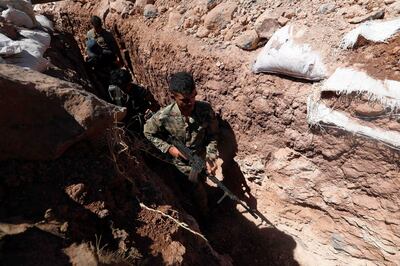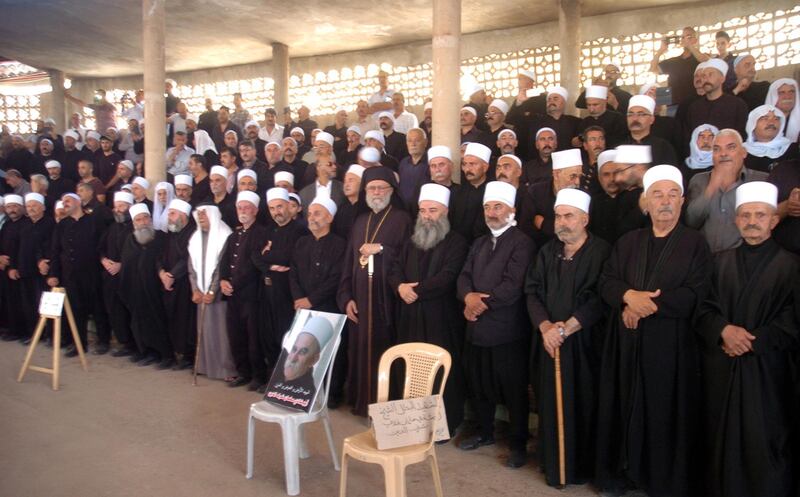At least 16 of the at least 27 hostages kidnapped by ISIS in southern Syria last month are children, Human Rights Watch said on Saturday, calling the abduction a “war crime”.
The group of mostly women and children were abducted by ISIS during a massive July 25 assault on the Druze community in Sweida, in which the militants killed more than 250 people.
They are being held by ISIS to use as leverage in negotiations with the Syrian government and its ally Russia, according to HRW.
"Hostage-taking is a war crime," the rights group said.
"Civilian lives should not be used as bargaining chips," said its deputy Middle East director Lama Fakih.
ISIS has lost the majority of the territory it captured when it overran eastern Syria and northern Iraq in mid-2014. An international coalition and allied ground forces have regained control of all of the population centres that the militant group once held. But it has retained a presence in southern Syria, near the border of the Israeli-occupied Golan Heights.
Of more than 30 people taken hostage in the July offensive, at least two have since died.
A 19-year-old male student was beheaded and a video circulated of the killing, which was not released on the militants' usual channels.
This month a 65-year-old woman died, with ISIS reporting she had been unwell.
Additionally, two women were able to escape after being abducted from their home, a family member told HRW.
Villagers provided the names of at least 27 people who remain in ISIS captivity, with children as young as seven among them, according to activists in Sweida province.
The province is the heartland of Syria's Druze minority, followers of an offshoot of Shiite Islam who are are despised as heretics by the Sunni extremists of ISIS.

ISIS is seeking the release of militants captured by the government in the neighbouring province of Daraa, the Britain-based Syrian Observatory for Human Rights said this month.
The militants currently hold less than 3 per cent of Syria, after losing territory to government forces backed by Russian firepower.
But ISIS has proven it is still able to launch deadly attacks, with eight pro-government fighters killed and more than 60 wounded in an overnight raid in Sweida province.
The attack brought to 54 the number of pro-government fighters killed in the past month, while 147 militants have been killed, the Observatory said.
Since the civil war erupted in Syria in 2011, more than 350,000 people have been killed and millions have fled their homes.
Elsewhere in the protracted civil war, Turkey warned on Friday against a possible Syrian government offensive on the last remaining rebel stronghold, while Russia indicated that it was losing its patience with the insurgents.
Turkish Foreign Minister Mevlut Cavusoglu, who was in Moscow for talks with Russian counterpart Sergey Lavrov, said that Russia and Turkey should work to separate opposition groups from "terrorists" in the north-western province of Idlib. He said a government offensive there would cause a "humanitarian catastrophe".
"Our goal is to alleviate the concerns of our Russian counterparts and get rid of the terrorists in that area," he told a briefing in Moscow. "We can work together but we could be putting civilian lives at risk while eradicating those radical groups."
Russia, which has been a key backer of Syrian President Bashar Al Assad, launched its operation in Syria in 2015, ultimately helping to turn the tide of the war in the government's favour.
Turkey, which supports some of the rebel groups along its border with Syria, has mediated ceasefire deals in several areas in Syria, including Idlib. Russia and Iran, which also backs Mr Al Assad, have also mediated ceasefires of their own.
In most such cases, opposition groups on the verge of surrender gave up their fight and were evacuated to remaining areas outside government control, mostly Idlib.
Taking Idlib by force would be a difficult challenge for Mr Al Assad's forces. As talk of a new government offensive swirled last week, the leader of Syria's Al Qaeda affiliate that is based in the province vowed to fight on there.
Abu Mohammed Al Golani said on Wednesday that state-sponsored surrenders of rebel groups would not happen in Idlib as they did elsewhere, because they would be considered "treason" by his Al Qaeda-linked fighters.
Mr Lavrov on Friday indicated that Moscow was losing patience with the militants in Idlib, whom the Kremlin has accused of targeting government positions as well as Russia's Syria military base from there.
Russia’s top diplomat said that when Turkey, Iran and Russia originally negotiated the ceasefire zones, Moscow did not expect militants to be "using it as a human shield" from which they could attack the government.
He acknowledged that the situation in Idlib was "complex" and called for the separation of militants from legitimate opposition groups. Mr Cavusoglu stayed on in Moscow to join a meeting later on Friday with top Russian and Turkish defence and intelligence officials to discuss the situation in Idlib.
_______________
Read more:
[ How Putin is engineering a politically palatable way out of Syria ]
[ Killings and abductions feed frustration in Syria's rebel-held Idlib ]
[ US to act 'very strongly' if Syria uses chemical arms: John Bolton ]
_______________





